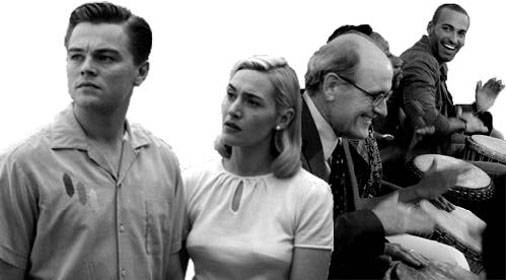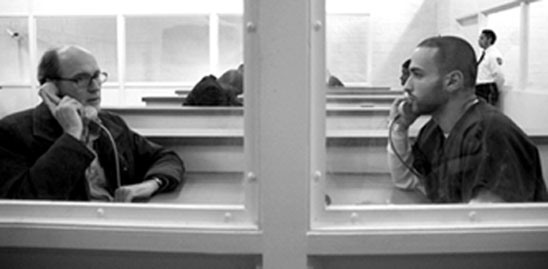Fourth Way Perspectives
Film Review:
Confronting The Truth of Modern Life— Revolutionary Road and The Visitor
“Plenty of people are onto the emptiness. But it takes real guts to see the hopelessness," Frank Wheeler (Leonardo DiCaprio) and his wife April (Kate Winslet) are told as their lives begin to unwind in a way they never suspected. Set in 1955 in suburban Connecticut, Revolutionary Road is based on Richard Yates' 1961 searing novel of the same name, and director Sam Mendes, best known for American Beauty (1999) and Road to Perdition (2002), stays true to Yates' message about the conformity and meaninglessness beneath the picture-perfect images of modern life. Mendes opens the film with Frank and April meeting at a hip Manhattan loft party, he working as a longshoreman hoping to be a night cashier at a cafeteria, and she trying to break into acting. "What interests you?" April wants to know. He says he wants "to feel" and then jests "If I had the answer to that one, I bet I'd bore us both to death in half an hour." Cut to seven years later. Frank and April, now the Wheelers, are suburban bound, two young children in tow, with April a bored housewife and Frank stuck in a job he hates, writing business manuals. Mendes' shots of Frank waiting for the commuter train with a long line of similarly suited and glum-faced men in hats, and their arrival in Grand Central Station says it all.
After a particularly harsh blowup between the couple, Frank blows off steam at the office by seducing a young, oval-faced, bosomy secretary (Zoe Kazan), while at home April decides the way out is for them to move to Paris. She will support the family by working as a secretary while he discovers what it is that interests him, that will make him feel more alive, more real. It's not rational, but she wins him over gushing, "Frank, you're the most beautiful and wonderful thing in the world.... you're a man."

Leonardo DiCaprio & Kate Winslet
in Revolutionary Road
and Richard Jenkings & Haaz Sleiman in The Visitor
For a brief spell they're back in the honeymoon of assurance in their specialness and the unison of their love and destination. But as man lives under the law of accident unless awakened, the influences created by life itself begin to intervene. A neighborly offer to meet the son of their realtor friend Helen Giving (Kathy Bates) and her husband Howard (Richard Easton), brings John (Michael Shannon) into their home. It is only John—a "certified lunatic" on four-hour leave from the insane asylum—who understands their plans as an escape from the hopeless emptiness of their lives. John bluntly tells them while walking on a nearby forest path, "Plenty of people are onto the emptiness. But it takes real guts to see the hopelessness."
In spite of Frank's apathy, he is offered a promotion at work. Once again his manhood is brought to the fore when a bullish top executive, Bart Pollock (Jay O. Sanders), tells him, "A man only has a couple of chances in life. If he doesn't grab one by the balls, he'll wake up wondering how he became second rate." This hits home for Frank, as he sees his own weaknesses through other people's eyes, and the desire to conform to what is "normal," "rational," and "sane" begins to impinge upon the couple's revolutionary plan.
The final blow to their scheme comes when April announces she's pregnant. Not one to resign easily, she decides she should have an abortion and buys the supplies necessary to do it herself. Frank is disgusted with the idea of abortion, but even more, he sees her pregnancy as a way to stay in his comfy life. As the dream of a meaningful future begins to die inside April, they are visited once again by crazy John, who sees the truth of their situation, but with his inability to relate within appropriate social conventions, he aggressively confronts Frank's need to hide behind his wife's skirt. With John's final affront—a curse on their unborn child—now April, too, is unnerved and unable to maintain the aim, and the Paris plan is shattered, together with April's will to aspire, to love and to live.
Americans Dreaming
One line in the end rings out as a clear message of April's understanding of a key to what Frank is missing. It seems she has come to something real herself, when she urges Frank to "Value what you do." Aimless and reactionary as he is, her words are probably too precise for him to hear.
True to the essential elements of the book, the screenplay explores the all-too-common story of the American dream gone sour, with heartfelt performances by DiCaprio and Winslet depicting Frank and April's struggle to escape the sterility and mechanicality of ordinary life. However, Richard Yates' poignant and eloquent novel, with its inner dialogue of the characters, takes us even further into the heights of Frank and April's idealism and their insight into the deep-rooted flaw in American society, where "nobody thinks or feels or cares any more; nobody thinks of anything except their own comfortable little goddamn mediocrity." The steps leading to April's abortion reveal the depth of her emotional struggle, as her dream for a different kind of life passes into alienation and detachment and the ending of an unwanted life at any cost.
The Visitor
Walter Vale (played by Academy Award Best Actor nominee Richard Jenkins), a taciturn college economics professor in The Visitor, also finds himself leading an empty and meaningless existence. With simplicity and terseness of dialogue, writer/director Tom McCarthy illustrates the protagonist as going through the motions of life, whether teaching a class or taking a piano lesson, all in a numb, indifferent, sleepwalking state.
Despite Walter's whine of excuses, he is sent by the Dean to speak at a Global Policy conference in Manhattan. Arriving at night to the apartment he has rarely visited since his wife's passing many years before, he is abruptly confronted by illegal tenants Tarek (Haaz Sleiman) and Zainab (Danai Gurira). The couple quickly surmise that they have been scammed into renting the unoccupied flat, and not wanting any trouble with the police, Tarek and Zainab pack their things to leave. At this point, Walter might just as easily have acted out his accustomed role of privilege, apathetically drinking his wine as the squatters are put out onto the streets. Instead, in a moment of uncharacteristic compassion, he offers the couple a few nights' stay while they look for another place.

Walter and Tarek speaking over phones at the detention center in The Visitor
At the conference Walter is his usual, unassuming and passive self, but we watch as, on a break, he is captivated by street drummers beating out tight African rhythms. Back at the apartment he finds Tarek practicing his djembe, an African drum, and the heartbeat of this musical film takes shape. Due to Tarek's natural aliveness the two meet in a spontaneous drum lesson, and a spark of awakening passion is born in Walter.
A qualitative shift occurs now for Walter. His moving center is enlivened, and as his hands and body open to the tempo of the drum, his feeling center too is engaged. Tarek offers wise counsel when he says, "Now Walter, I know you're a very smart man, but with the drum you have to remember not to think. Thinking just screws it up."
The unlikely friendship deepens as Walter joins Tarek for an upbeat afternoon at a drum circle in the park, and as the film sways in an ecstatic accent of sound and movement, we see Walter come alive. Now they jaunt back to the subway, rushing to meet Zainab, but unforeseen misfortune strikes, and Tarek is arrested.
A twist of fate, and Tarek and Zainab's worst fears are realized as he is turned over to immigration and placed in a detention center where Zainab can't visit. Both are in the U.S. illegally, Tarek from Syria and Zainab from Senegal. Walter visits Tarek in detention, where on the walls are paintings of the Statue of Liberty and a poster declaring "The Strength of America.... America's Immigrants," a mockery to this overcrowded prison with no privacy and no rights for its inmates. As Tarek is deadened through confinement, Walter's conscience is kindled as he tries to help obtain Tarek's release. In observing the reversal of conditions for Walter and Tarek, inner limitations versus outer restrictions, we can recognize the truth of our imprisonment.
Supporting his efforts, Walter is joined by Tarek's mother, Mauna (Hiam Abbass), who has come from Minnesota to help her son. Given today's culture, it is interesting to watch how Mauna, a Moslem, soft-spoken and lovely, interacts with Walter. Slowly, the attraction between her and Walter grows and evokes explicit expressions of the guilt each carry as being a cause of Tarek's arrest. The unjust secrecy of the immigration authority and the inhumane prison conditions drive Tarek to bitter agitation and lead Mauna to cry, "This feels like Syria."
An Opening
In their one night out together, Walter is moved to open up to Mauna, and in a moment of bare candor he says, "The truth is I haven't done any real work in a very long time. I pretend that I'm busy, that I'm working. I'm not doing anything." In this moment of truth Walter's face transforms. This realization ignites a newly felt courage in Walter, and the next morning, as the guard in the prison lobby has no answers as to where Tarek has been relocated, and then warns, "Sir, for the last time, step away from the window please," Walter erupts in anger at the lies and injustice of the government complex, and he yells, "You can't just take people away like that! It's not fair. We are not just helpless children!" In compelling cinematography we watch Walter from the guard's side of the glass, as he assails men's ignorance and the deep sleep in which he, and they, and we live.
In the end, Tarek and Mauna's paths must follow the course predetermined by American policies, as he is deported back to Syria, his mother following. But Walter now treads a new octave. As the film ends, we see him sitting underground in the subway rhythmically striking the djembe in a percussive labor of new-found life. He has begun to feel.
Where the Wheelers in Revolutionary Road have come upon the emptiness that is the substratum of ordinary life, they have yet to realize its hopelessness. They are just trading Connecticut for Paris. Real change is vertical, not horizontal. The way out doesn't exist on the same level as ordinary life, and so is a blessing when found—which we see the beginning of The Visitor when Walter discovers genuine feeling. If it doesn't evolve to real questioning then he'll simply end up drumming and nothing more. Let's hope he hears a deeper call.
—Jean Lauderdale

